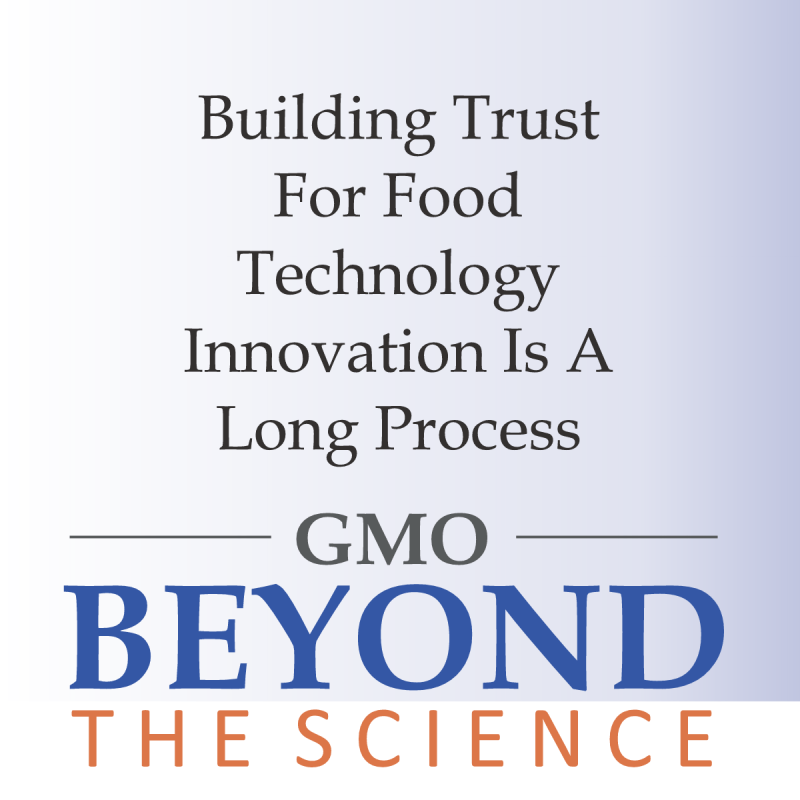 Charlie Arnot, CEO, Center for Food Integrity | March 9, 2017
Charlie Arnot, CEO, Center for Food Integrity | March 9, 2017
ALSO READ:
How 2016 Transformed The GMO Debate And Paved The Way For Consumer Acceptance
David Ropeik
Growing public acceptance of genetic modification technology is a sign that farmers and food-makers are closer to meeting public expectations than some might want you to believe. Traditionally, public trust of our food and the people who grow it have been taken for granted. Family farms and all they represent are deeply rooted in our culture. As the food system has become more integrated, with larger farms and companies producing food, the public wonders whether the food system is still worthy of their trust.

It would convenient if the social decision-making process were logical and rational – that we live in a world where 2 + 2 = 4, the earth is round and hydrogen and oxygen combine to make water. But it’s more complicated than that.
Today’s environment is one in which many factors drive consumer opinions, feelings and beliefs – particularly when it comes to controversial emotion-laden issues – and facts are only one element in the decision-making equation.
Focus group research conducted by The Center for Food Integrity (CFI) a few years ago invited participants to give their reaction to the statement that GMOs have been used for 20 years with no reports of ill health effects. It was meant to impart reassurance that the technology is safe.
Focus group participants weren’t comforted.
“This is beyond scary to me,” one woman replied. “I feel like I’ve been deceived. The fact that we’ve been eating this stuff [for decades] … why weren’t they providing more information all along about what I’m eating?”
The reaction drives home the point that consumers want authentic transparency. They want all the details – the good, the bad and the ugly – so they can decide for themselves. When GMOs were introduced, both scientific studies and regulatory bodies concluded they were safe, so not much consideration was given to providing additional details to the public. Though unintentional, this lack of transparency eroded consumer trust in GMO technology and the food system in general.
Authentic transparency can transform a relationship that is tarnished with suspicion by reducing fear of the unknown and creating a platform for building trust. CFI’s consumer trust research proves that as those in the food system increase transparency, they will also increase consumer trust.
Including information on product labels is important but only one of many practices that demonstrate transparency. CFI’s research shows offering engagement opportunities through websites and providing protection for whistleblowers also ranked high among practices that demonstrate transparency. Practices are a demonstration of a company’s values in action, and CFI’s research shows shared values are the foundation for building trust.
Shared values are three to five times more important than skills, expertise or science according to CFI’s peer-reviewed and published trust model. Consumers don’t simply want to know whether something “can” be done, but rather whether it “should” be done. Social acceptance must come before scientific verification.

Winning consumer trust begins with demonstrating that you care about the topics they care about most – safe food, protecting the environment, quality nutrition, appropriate animal care, and others. As a wise person once stated, “People don’t care how much you know until they know how much you care.”
The application of technology in food and agriculture has provided countless benefits to society – from refrigeration to precision planting, from pasteurization to drought-tolerant hybrids. Innovation and technology help us meet one of humanity’s most basic needs – the need to provide safe, nutritious food for our children and our children’s children.
But more must be done. Producing food has more impact on the planet than any other human activity and we have to produce more food, using fewer resources every year. The responsible use of technology is key to addressing this moral imperative.
Our challenge is not just better technology, but finding better ways to support the informed public evaluation of those technologies and our food production system. While we know that science alone will not build public support for complex, controversial technology, we need to encourage earnest consideration of scientific consensus in the social decision-making process when it comes to innovation and technology that drive agriculture and food.
Consumer concern and skepticism about food production are understandable. The consolidation, integration and application of technology that make food safe, available and affordable also prompt concerns about whether science benefits society or only those who control it as well as skepticism about the motivation of those in food and agriculture.
Our goal should not be to win a scientific or social argument, but to find more meaningful and relevant methods to introduce science in a way that encourages thoughtful consideration and informed decision making.
 Charlie Arnot is the CEO of the Center for Food Integrity. The Center for Food Integrity is a not-for-profit organization that helps today’s food system earn consumer trust. Our members and project partners, who represent the diversity of the food system, are committed to providing accurate information and working together to address important issues in food and agriculture. The Center does not lobby or advocate for individual companies or brands. For more information, visit www.foodintegrity.org.
Charlie Arnot is the CEO of the Center for Food Integrity. The Center for Food Integrity is a not-for-profit organization that helps today’s food system earn consumer trust. Our members and project partners, who represent the diversity of the food system, are committed to providing accurate information and working together to address important issues in food and agriculture. The Center does not lobby or advocate for individual companies or brands. For more information, visit www.foodintegrity.org.
The Genetic Literacy Project is a 501(c)(3) non profit dedicated to helping the public, journalists, policy makers and scientists better communicate the advances and ethical and technological challenges ushered in by the biotechnology and genetics revolution, addressing both human genetics and food and farming. We are one of two websites overseen by the Science Literacy Project; our sister site, the Epigenetics Literacy Project, addresses the challenges surrounding emerging data-rich technologies.































